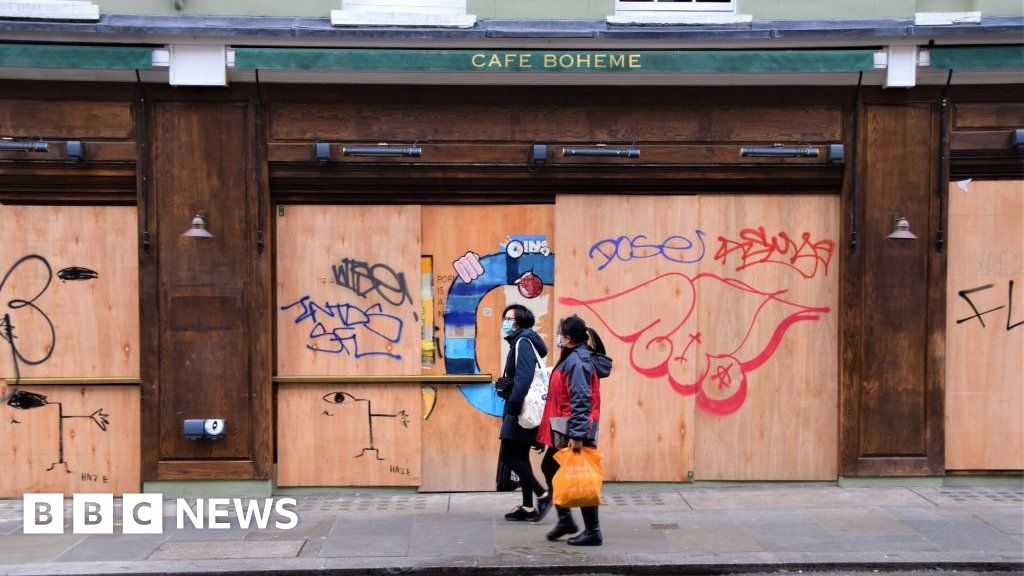Covid: One In Three UK Hospitality Firms Fear Collapse

By Howard Mustoe
Business reporter
- Published
image copyrightGetty Images
More than a third of hospitality firms say they have little or no confidence of surviving the next three months, according to data collected by the Office for National Statistics (ONS).
The sector, which includes hotels, bars and restaurants, is the most downbeat about its prospects, the survey found.
The lockdowns and restrictions caused by Covid-19 have hit the industry hard.
Earlier this week, trade body UK Hospitality said the sector had lost 660,000 jobs so far this year.
UK Hospitality chief Kate Nicholls told MPs on Tuesday that at the end of 2019, the sector had been the third-largest employer in the UK.
Across the economy as a whole, the ONS found 14% of businesses felt they had "low or no confidence" of survival.
The ONS sampled 38,760 UK businesses sampled, of which just over a quarter responded.
It said 40% had moderate confidence that their business would survive the next three months, while another 40% said that they had high confidence of getting by.
The second-most pessimistic group after hospitality businesses was the administrative and support service activities industry, with 18% of firms pessimistic about staying afloat.
image copyrightSteven Hughes
Harvey Ward runs Ideas Box, a company which supplies tricycles for birthdays and corporate events, serving cocktails and treats.
It's been a successful business but relies on large gatherings, he says.
His business turned over £850,000 last year, but since coronavirus, that's dwindled to £5,000.
Because it doesn't fit the government's criteria for hospitality relief, he hasn't received any cut in the business rates he pays, despite his sales collapsing.
While pubs and restaurants have not paid business rates and benefited from schemes like Eat Out to Help Out, businesses like his are falling through the cracks, he says.
"What winds me up is when the government says it's helping hospitality businesses, or all businesses that are closed," he says. "It's not quite the case."
He received a loan through the Coronavirus Business Interruption Loan Scheme (CBILS), and he says "furlough has been great" since he's been able to keep some staff. But he has had to lay off most of his workers.
Every month his overheads - which include rates and costs such as vehicle loans, insurance and utility bills - are about £4,000, despite no work coming in.
But for a few months of rent relief from his landlord and his savings he'd be in far worse trouble, he said.
He will start soon as a grocery delivery driver to keep himself going, he adds.
"Until mid-March we had a lovely little business we'd been slowly building up going back 20 years.
"To be told you're not viable, you're not really getting any help, and to see other industries getting Eat Out... I feel we very much have fallen through the cracks."
FSB National Chairman Mike Cherry said: "A lot of the hardest-hit small firms have received the help they need but too many have been left in the lurch.
"If we're serious about a substantial recovery from the hardship wrought by this pandemic, that needs to change."
It's important to note the dates on these latest ONS figures.
Firms were asked questions about the period from 19 October to 1 November, when Wales had started a week of circuit breaker and parts of Scotland were on Tier 3 restrictions, but England hadn't yet entered the renewed lockdown.
The fact that only 82% were trading even before stricter restrictions were UK-wide - the lowest level since August - is concerning.
When you note that the answers were collected in the first two weeks of November it's even more worrying because that is after the date when Rishi Sunak did a huge U-turn and said he would, after all, extend the furlough scheme to the end of March.
If, even with the furlough scheme, 14% of businesses across industry and 34% in the accommodation and food services business don't think they will survive, that's hundreds of thousands of firms saying they need more support than is currently available to get through the remainder of the pandemic.
And that's understandable. Firms that can't trade because of restrictions may have their staff costs covered. But they can't pay rent, bills and suppliers with thin air.
From Chip War To Cloud War: The Next Frontier In Global Tech Competition
The global chip war, characterized by intense competition among nations and corporations for supremacy in semiconductor ... Read more
The High Stakes Of Tech Regulation: Security Risks And Market Dynamics
The influence of tech giants in the global economy continues to grow, raising crucial questions about how to balance sec... Read more
The Tyranny Of Instagram Interiors: Why It's Time To Break Free From Algorithm-Driven Aesthetics
Instagram has become a dominant force in shaping interior design trends, offering a seemingly endless stream of inspirat... Read more
The Data Crunch In AI: Strategies For Sustainability
Exploring solutions to the imminent exhaustion of internet data for AI training.As the artificial intelligence (AI) indu... Read more
Google Abandons Four-Year Effort To Remove Cookies From Chrome Browser
After four years of dedicated effort, Google has decided to abandon its plan to remove third-party cookies from its Chro... Read more
LinkedIn Embraces AI And Gamification To Drive User Engagement And Revenue
In an effort to tackle slowing revenue growth and enhance user engagement, LinkedIn is turning to artificial intelligenc... Read more

